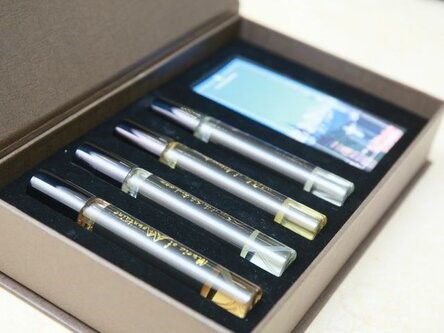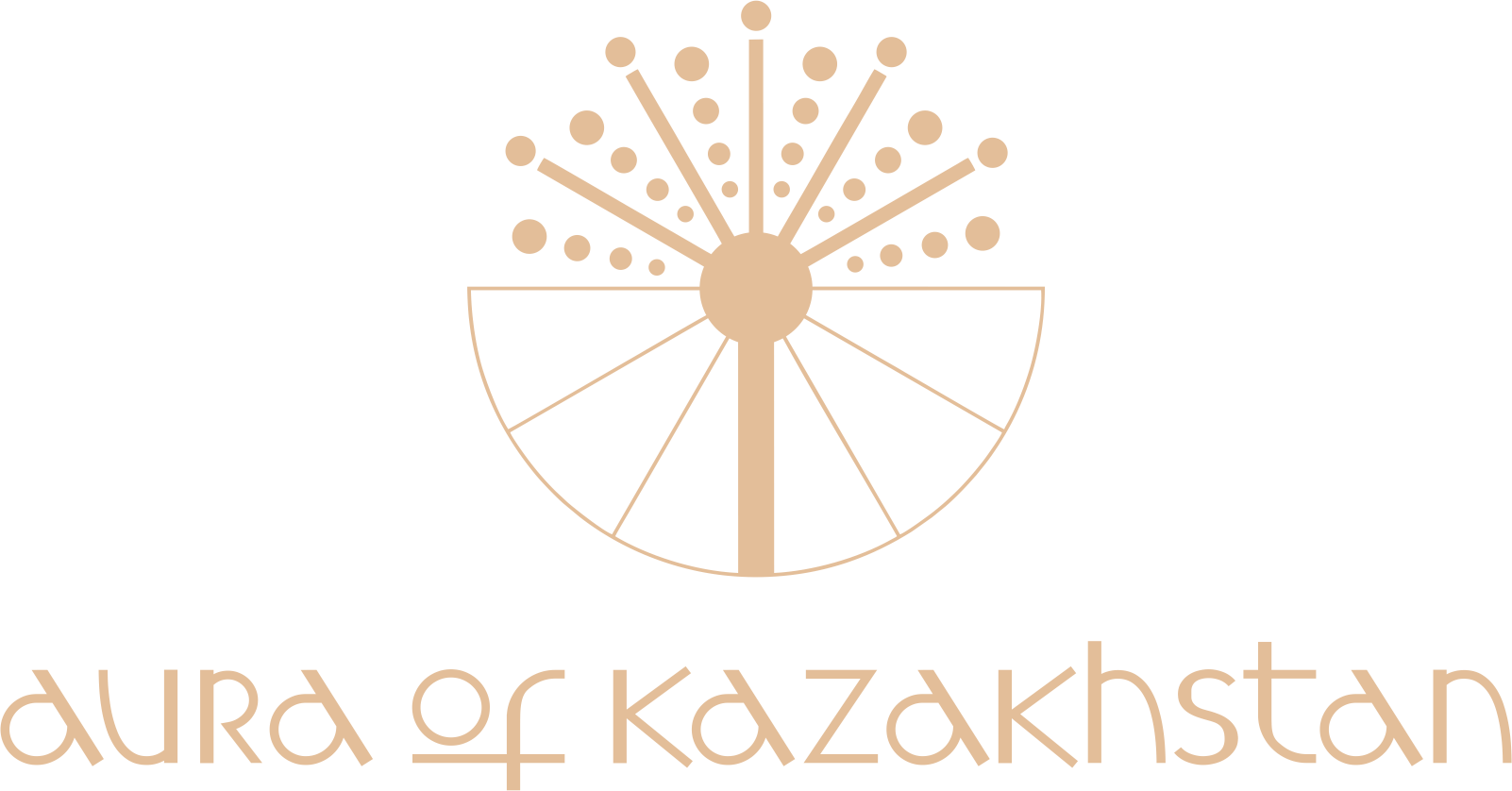Author: Ksenia Bondal

Niche in perfumery
Kazakhstan's haute couture perfumes will become competitive, according to the perfume house Aura of Kazakhstan
Perfume is an invisible accessory that affects our emotions much more than jewelry, shoes or handbags, says Yulia Lukyanenko, creative director of Aura of Kazakhstan
Aura of Kazakhstan is the first Kazakh brand of niche perfumes. It appeared on the market in August of this year. "Aura fragrances are dedicated to the unique cultural heritage of our country, the richness and diversity of our nature," she said during a conversation with the correspondent of Capital.kz».
How difficult is it? How much will it cost to create a perfume collection? Olga Brener, the owner of the Aura of Kazakhstan perfume house, and Yulia Lukyanenko, the creative director, told about these and other nuances of the business.
- Olga, Yulia, the perfume market in Kazakhstan is highly competitive, we import a large volume of products from famous world manufacturers. How do you intend to develop successfully in such conditions?
Yulia Lukyanenko: Perfumery has its own gradation of products: extracts, where the content of the perfume composition is 15-30%, followed by eau de perfum - this is the broadest category that is now popular, the content of the perfume composition is 10-15%, then eau de toilette (from 5 to 10%), complete this line of colognes (3-5%).
The higher the percentage of the perfume composition, the richer, deeper and more persistent the fragrance itself will be.
For ourselves, we decided that the percentage of perfume composition in our fragrances will be 15-18%. This will make them truly luxurious, bright, noticeable, and plume-like. Eau de toilette and colognes do not have these qualities.
We asked the perfumers who developed the compositions for us to use any ingredients, even the most unique and expensive-the only condition was the exact hit in the brief (technical task for the perfumer). In this way, we were able to achieve a rich sound of our spirits and maximum compliance with our uniqueness.
The modern perfume of the era of rapid consumption has a task – the perfume must sell itself in the store in 20-30 seconds, which is how much the buyer usually spends on evaluating one fragrance. And if in this short period of time the smell is not hooked, the customer will go to the stand of another brand.
Niche brands have different goals. We do not pursue fast sales, it is more important for us to build long-term trusting relationships with customers, to choose fragrances to suit their mood, to create a "perfume wardrobe" so that they can wear not just perfumes with joy and pride, but "aromas of their native land".
- So you don't want to quickly expand your line, following the example of perfume concerns?
Olga Berner: Not so fast, no. In a sense, we would like to return to the origins of the perfume industry, when the novelty from the perfume house was waited for with impatience and curiosity, followed the news about the upcoming presentations of new fragrances. When the visit to the perfume boutique itself was something special. Manufacturers have now spoiled people with their marketing approach, coming to large stores, people see a huge selection of products from different brands, consultants cannot tell you well about the advantages of each individual fragrance, and people are not ready and do not want to spend time shopping. They quickly choose a new product they like and go to the checkout.
We want to return perfumery to the status of high art, when perfume is not just a part of the image, but an exquisite invisible accessory that can make your day happier. We also want to change the concept of perfume shopping, when the purchase is made not just with comfort, but you can also get additional bonuses in the form of presentations, individual consultations, etc.
- You mentioned the perfumers who created the collection for you. Who are they?
Yulia Lukyanenko: Initially, we announced a large tender, which was attended by major European perfume concerns, as well as a number of independent perfumers. The competition was attended by 30 professionals, of whom only 5 eventually became the winners of the tender, their work most accurately fell into our briefs. We did not set them the task of creating a fragrance similar to some other, mass and popular, did not want to get the most commercial smell and did not drive them within a certain budget, as companies focused on fast sales now do. In the current age of fast consumption, brands are releasing new products at the rate of 10 flavors per year. It was more important for us to create a collection of unique fragrances about Kazakhstan, so that every citizen of Kazakhstan had the opportunity to choose something native for themselves, and to demonstrate the beauty and uniqueness of our country to foreign buyers through fragrances.
As for your question about perfumers, we are working with Sir McCartney (UK), Sebastian Martin and Vanessa Pruden (France), Luca Suzaki Angela Champagna (Spain).
- They'd all been to Kazakhstan? There is a feeling that to create a perfume about the country, you need to "smell" it.
Yulia Lukyanenko: Three of them were in our country at different times. We sent photos and videos about Kazakhstan, samples of our steppe and mountain grasses and flowers to the others along with the brief notes.
- What unusual, expensive components did the perfumers use in their work on the collection?
Yulia Lukyanenko: We did not limit perfumers in the budget, so we got this result. They were allowed to use any ingredients – extracts of agar and ebony wood, expensive essences of myrrh and frankincense from the Arabian Peninsula, which are extracted by hand. These are the most expensive perfume components in the world, which not all manufacturers can afford.
-"Interesting." How much of your money did they spend on their creative experiments? And how much money did you invest in the project?
Olga Berner: The winners of the tender receive a fee for the development of the fragrance, and the plant receives a contract for the production of the substance. I can say that at the first stage, investments in development and production amounted to about $ 700 thousand. In the coming year, it is planned to invest the same amount in marketing and production.
- By perfume standards, is $700 thousand a lot?
Olga Berner: For an exclusive niche perfume at the first stage, this is enough. Of course, there are huge perfume factories with large automated lines, a huge staff of employees. Our production is small, semi-automatic, because this is the only way we can guarantee the high quality of our products.
- By the way, about sales. You said that your fragrances are persistent, so the perfume will be used for a long time. It seems that it is not profitable for you.
Olga Berner: That is why the cost of our perfumes is higher than the cost of perfumes in the luxury segment.
- Tell us about the payback period of the project.
Olga Berner: According to our calculations, it is 2-3 years.
-That’s not for long.
Olga Berner: This is our positive forecast.
- I wonder where you bring the concentrate for your production from?
Olga Berner: We buy perfume compositions in the EU countries, as well as bottles, lids, and packaging. But the production of perfumes is organized in Kazakhstan. We have a small workshop, it is equipped with a laboratory where the formulas of perfumes are tested, initial and final, taking into account the specifics of the local alcohol. Here, the process of preparing flavors takes place. There is a specialized room for aging perfume compositions, filtration, maceration. There are technologists and specially trained personnel working there. There is also a workshop for bottling, "plugging" and further packaging. At each stage, our products undergo a thorough quality control.
- What is the capacity of the workshop?
Olga Berner: We do not have an assembly line, not in-line production, so it is difficult to say. By the opening, we have produced 5 thousand bottles, the potential of the workshop is 2 thousand bottles per day with semi-automatic production. But there is no need for this now.
- How long does it take from the beginning of the production of perfume to the time when it is beautifully packaged?
Yulia Lukyanenko: On average, from 5 to 10 months due to the production technology. It all depends on the complexity of the perfume composition and its ingredients. Some compositions need 2-3 months to mature. And it happens that even 5-6 months they reach the desired condition.

- What figure does the cost of a new fragrance start from?
Olga Berner: In order to add another perfume to the line of niche fragrances, you will have to spend from $50 thousand. Depending on the complexity of the composition. This is provided that the bottles, lids, accessories and packaging have already been purchased.
- Have you already identified your target foreign markets?
Olga Berner: First of all – the CIS market, as we are united by the historical past, and geographically we are close. In Europe and America, there is now a fashion for ethnics and authentic goods. I think they'll be interested.
Yulia Lukyanenko: I also look forward to the Middle East. Although we have different latitudes and climates, they still consider us a country close in culture, in addition, customers there love rich compositions, luxurious decoration, expensive glass. We hope that this region will receive us favorably.


